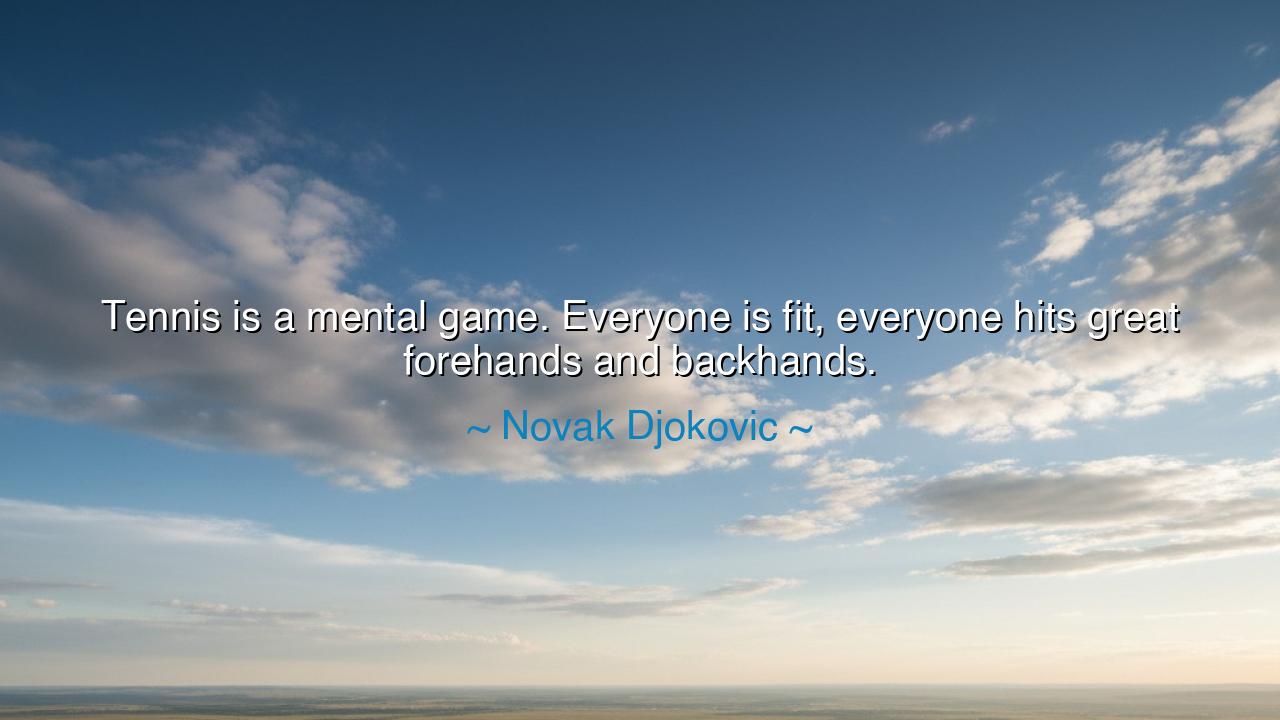
Tennis is a mental game. Everyone is fit, everyone hits great






Hear, O seekers of mastery and students of endurance, the words of Novak Djokovic, the great warrior of the court, who declared: “Tennis is a mental game. Everyone is fit, everyone hits great forehands and backhands.” Beneath these modest words lies a truth known to champions and philosophers alike—that the mind is the true battlefield, and victory belongs not to the strongest of body, but to the steadfast of spirit. For in the arena where equals contend, it is the unseen strength of the soul that separates triumph from defeat.
Djokovic’s quote arises from the furnace of experience. In the modern age of tennis, all players are sculpted by relentless training. They run faster, strike cleaner, and endure longer than any generation before them. Yet still, not all emerge victorious. The difference, as Djokovic reveals, is mental resilience—the power to focus when exhaustion beckons, to remain calm when the crowd roars, and to rise again when the body screams to yield. This is the unseen mastery that transforms a player into a champion.
The ancients would have understood this well. The Greeks spoke of arete—the excellence of mind and body united in purpose. The Spartans trained their warriors not only to fight but to think, to withstand fear as much as pain. For they knew that strength without composure is like a blade without a handle—powerful, yet useless in the moment of truth. So too does Djokovic remind us that discipline of thought is the foundation of all mastery. To rule the mind is to rule the game.
Consider the story of Djokovic himself, who faced both physical and spiritual trials on his path to greatness. Early in his career, he was mocked for retiring from matches due to breathing problems. Many doubted his endurance. But through meditation, diet, and deep introspection, he turned weakness into strength. He learned not only to breathe better but to think better, to quiet the chaos of expectation. In time, he rose from the ashes of ridicule to become one of the greatest in history. His victories, more than the trophies, stand as monuments to mental transformation.
Yet this truth extends beyond the court. In every endeavor—whether it be art, science, business, or war—the final contest is always within. Many possess skill, yet few possess the serenity to use it when it matters most. A musician may have technique, but without emotional balance, the melody falters. A general may have armies, but without clarity of judgment, even victory breeds ruin. Djokovic’s wisdom thus speaks to all: mastery of craft is worthless without mastery of mind.
There is also humility in his words. By saying “everyone hits great forehands and backhands,” he acknowledges the equality of talent among his peers. He does not claim superiority of gift, only superiority of focus. This humility is not weakness—it is awareness. He understands that greatness is not bestowed, but chosen, moment by moment, through persistence and clarity. In this humility lies the secret of his enduring power: ego silenced, awareness awakened.
The lesson for us, O listeners, is clear. Strengthen the body, but do not neglect the mind. Train your thoughts as you train your muscles. When doubt arises, let discipline silence it. When fear whispers, let calm reason answer. Remember that in every contest, the one who conquers himself has already conquered the world.
Thus, the teaching of Novak Djokovic becomes eternal: the true game is not played with the racket, but with the heart and mind in unison. For in the end, when all players are skilled and the margins are thin, it is the soul that serves the final ball—and only those who master their inner court shall stand victorious beneath the sun.






AAdministratorAdministrator
Welcome, honored guests. Please leave a comment, we will respond soon